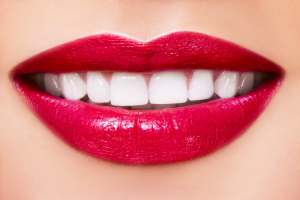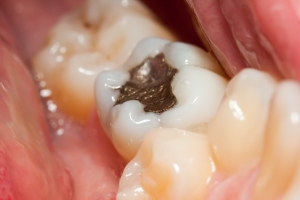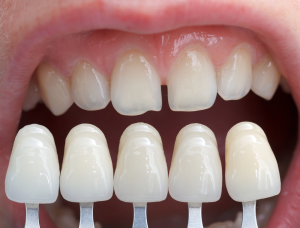 Have you been trying to become accustomed to having an open space in your mouth after tooth loss but you just don’t feel comfortable? Are you disappointed in your appearance, causing you to back out of social engagements or to feel embarrassed to speak with others? Whatever the emotional toll tooth loss has taken, it can negatively affect your daily comfort and oral health, as well. Rather than trying to rationalize living with a gap in your smile, we encourage you to learn more about the benefits of dental bridges. For patients missing one tooth or up to three teeth in a row, this prosthetic may offer the improved daily qualify of life you have been hoping to achieve. Learn more with the following:
Have you been trying to become accustomed to having an open space in your mouth after tooth loss but you just don’t feel comfortable? Are you disappointed in your appearance, causing you to back out of social engagements or to feel embarrassed to speak with others? Whatever the emotional toll tooth loss has taken, it can negatively affect your daily comfort and oral health, as well. Rather than trying to rationalize living with a gap in your smile, we encourage you to learn more about the benefits of dental bridges. For patients missing one tooth or up to three teeth in a row, this prosthetic may offer the improved daily qualify of life you have been hoping to achieve. Learn more with the following:
Correct Imperfections With Dental Bonding
 What do you think about your smile when you take a look in the mirror? Are you worried about small chips on your teeth? Do you feel like you enjoy the appearance of your smile for the most part but you wish you could magically add a little more tooth tissue in certain areas to perfect the way it looks? If building up your teeth would make you feel wonderful about your beautiful smile – rather than a smile that’s just okay – we encourage you to learn more about dental bonding. This simple treatment may allow you to achieve the minor improvements you desire without requiring multiple visits and without making a dent in your wallet. Learn more about whether bonding is right for you:
What do you think about your smile when you take a look in the mirror? Are you worried about small chips on your teeth? Do you feel like you enjoy the appearance of your smile for the most part but you wish you could magically add a little more tooth tissue in certain areas to perfect the way it looks? If building up your teeth would make you feel wonderful about your beautiful smile – rather than a smile that’s just okay – we encourage you to learn more about dental bonding. This simple treatment may allow you to achieve the minor improvements you desire without requiring multiple visits and without making a dent in your wallet. Learn more about whether bonding is right for you:
The Many Benefits of A Straight Smile
 If you are considering clear braces as an adult, you may give yourself a bit of a hard time regarding your final decision. We find that patients love the benefits offered by Invisalign but often wonder whether making a cosmetic improvement to their smile is really necessary. When it comes to aligning your smile and bite, we are here to tell you that a straight smile offers advantages you may never have considered before. The benefits are not only esthetic in nature – a straighter smile can also have a significantly positive impact on your oral health and daily comfort. Hoping to learn more? Consider the following information:
If you are considering clear braces as an adult, you may give yourself a bit of a hard time regarding your final decision. We find that patients love the benefits offered by Invisalign but often wonder whether making a cosmetic improvement to their smile is really necessary. When it comes to aligning your smile and bite, we are here to tell you that a straight smile offers advantages you may never have considered before. The benefits are not only esthetic in nature – a straighter smile can also have a significantly positive impact on your oral health and daily comfort. Hoping to learn more? Consider the following information:
Do You Suffer from TMJ Disorder?
 Are you aware that TMJ disorder (TMD) refers to jaw joint problems but you aren’t quite sure about the details? Perhaps you suffer from daily discomfort but assume TMD treatment is for someone else – someone with severe problems. Jaw discomfort exists on a wide spectrum, which means whether your symptoms are mild or extreme, TMJ treatment may help. In fact, the sooner you begin treating problems with jaw function, the greater your ability to quickly ease your symptoms and protect the long-term health of these supportive structures. Curious if you suffer from this concern? Learn more:
Are you aware that TMJ disorder (TMD) refers to jaw joint problems but you aren’t quite sure about the details? Perhaps you suffer from daily discomfort but assume TMD treatment is for someone else – someone with severe problems. Jaw discomfort exists on a wide spectrum, which means whether your symptoms are mild or extreme, TMJ treatment may help. In fact, the sooner you begin treating problems with jaw function, the greater your ability to quickly ease your symptoms and protect the long-term health of these supportive structures. Curious if you suffer from this concern? Learn more:
Do You Need Full Mouth Rehabilitation?
 Do you find that you feel overwhelmed by the current health, appearance, and structural condition of your smile? Have you considered seeking dental care but assume your problems are simply too complex or that your health is in too great a need of repair? Rather than making assumptions, we invite you to consider the comprehensive nature of restorative and cosmetic dentistry. What you may view as a severe problem we look at as an exciting challenge with endless potential. Through the use of advanced dental technology and treatments, we offer patients full-mouth rehabilitation. Wondering if this solution is appropriate for your needs? We encourage you to make this determination sooner than later, so we may begin to guide you back toward good health and comfort.
Do you find that you feel overwhelmed by the current health, appearance, and structural condition of your smile? Have you considered seeking dental care but assume your problems are simply too complex or that your health is in too great a need of repair? Rather than making assumptions, we invite you to consider the comprehensive nature of restorative and cosmetic dentistry. What you may view as a severe problem we look at as an exciting challenge with endless potential. Through the use of advanced dental technology and treatments, we offer patients full-mouth rehabilitation. Wondering if this solution is appropriate for your needs? We encourage you to make this determination sooner than later, so we may begin to guide you back toward good health and comfort.
About Your Invisalign Treatment
 Have you decided that you are ready to wear clear braces for a straighter, more beautiful smile? If so, you are probably well informed on the many benefits of Invisalign treatment. In addition to wearing thin, clear, plastic trays that most people will not even notice, you can take them out during the day to eat or clean your teeth. Not bad, particularly when compared with metal braces. However, we find that patients understand the advantages but often still have questions regarding what to expect from the treatment process. We will walk you through the steps to receiving and using your trays below, so you can feel excited and confident about treatment:
Have you decided that you are ready to wear clear braces for a straighter, more beautiful smile? If so, you are probably well informed on the many benefits of Invisalign treatment. In addition to wearing thin, clear, plastic trays that most people will not even notice, you can take them out during the day to eat or clean your teeth. Not bad, particularly when compared with metal braces. However, we find that patients understand the advantages but often still have questions regarding what to expect from the treatment process. We will walk you through the steps to receiving and using your trays below, so you can feel excited and confident about treatment:
Teeth Whitening Common Questions (And Answers)
 Have you been considering learning more about teeth whitening for a brighter more beautiful smile? If so, we encourage you to familiarize yourself with your options. Patients sometimes assume whitening is only available to suit a small pool of candidates when it is actually available in a variety of option to suit many needs. In addition, we often find that patients compare professional whitening systems to that of over-the-counter (OTC) solutions, which may cause some confusion. For answers to your questions about whether this cosmetic treatment offers you what you want for a stunning smile, look over the following:
Have you been considering learning more about teeth whitening for a brighter more beautiful smile? If so, we encourage you to familiarize yourself with your options. Patients sometimes assume whitening is only available to suit a small pool of candidates when it is actually available in a variety of option to suit many needs. In addition, we often find that patients compare professional whitening systems to that of over-the-counter (OTC) solutions, which may cause some confusion. For answers to your questions about whether this cosmetic treatment offers you what you want for a stunning smile, look over the following:
What Are Metal-Free Fillings?
 Do you know the difference between fillings? The most commonly used fillings in the past were silver amalgam fillings, but today there are metal-free fillings. Metal fillings can mar a beautiful white smile even if they are only used in the back molars. When people open up their mouth to laugh or yawn, metal fillings are extremely obvious. You wouldn’t probably judge a person for their fillings because there are most likely very few people that don’t have at least one filling in their mouth. However, you might wonder about their dental health after seeing a mouthful when they laugh. So…what exactly are metal-free fillings? (more…)
Do you know the difference between fillings? The most commonly used fillings in the past were silver amalgam fillings, but today there are metal-free fillings. Metal fillings can mar a beautiful white smile even if they are only used in the back molars. When people open up their mouth to laugh or yawn, metal fillings are extremely obvious. You wouldn’t probably judge a person for their fillings because there are most likely very few people that don’t have at least one filling in their mouth. However, you might wonder about their dental health after seeing a mouthful when they laugh. So…what exactly are metal-free fillings? (more…)
What Do You Know About Porcelain Veneers?
 Have you been thinking about rejuvenating your smile? It is still January. Was that one of your New Year’s resolutions? There is still time. There is always time. Your smile is one of the first things that people notice and it can affect the way people treat you. Individuals with a bright, healthy looking smile are treated with more respect, get more attention, and get smiled at more often. Today a smile makeover doesn’t have to break the bank. There are many treatments to choose from spanning from less-invasive and less-expensive, to more complicated and costly. You can choose. Porcelain veneers are one treatment option available today. Take our quiz below to find out what you know about porcelain veneers.
Have you been thinking about rejuvenating your smile? It is still January. Was that one of your New Year’s resolutions? There is still time. There is always time. Your smile is one of the first things that people notice and it can affect the way people treat you. Individuals with a bright, healthy looking smile are treated with more respect, get more attention, and get smiled at more often. Today a smile makeover doesn’t have to break the bank. There are many treatments to choose from spanning from less-invasive and less-expensive, to more complicated and costly. You can choose. Porcelain veneers are one treatment option available today. Take our quiz below to find out what you know about porcelain veneers.
(more…)
Hello world!
Welcome to WordPress. This is your first post. Edit or delete it, then start blogging!







